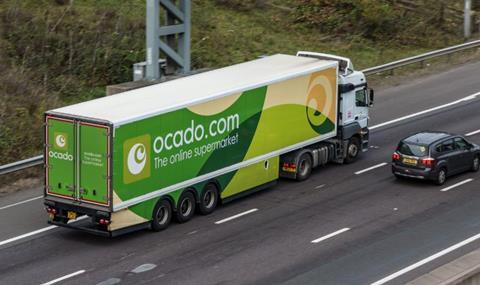
Ocado saw an almost fivefold reduction in its pre-tax losses last year aided by soaring demand for online groceries during the Covid-19 pandemic.
The retailer’s latest annual results to 29 November 2020 reveal losses of £44m, compared to a loss of £214.5m in the previous year.
Group revenue rose 33% to £2.3bn (£2019: £1.8bn) in the period with EBITDA also surging by 69% to £73.1m (2019: £43.3m).
Ocado’s retail division provided the lion’s share of the revenue growth, delivering £2.1bn of revenue, up 35.3% on the previous year, reflecting increased online demand during the Covid-19 pandemic, with a £31 increase in the average basket value from £106 to £137.
The retailer’s UK Solutions and Logistics division saw a 13.6% revenue rise to £654.3m (2019: £576m), thanks to an increase in fees driven by additional customer fulfilment centre (CFC) capacity.
The logistics division’s distribution and administrative costs grew by 20.8% to £613.3m (2019: £507.5m) in the period largely due to the growth in average basket sizes which saw the average number of customer orders delivered by each van in a week falling to 184 (2019: 196), which in turn required more deliveries. These additional costs were recharged to Ocado Retail and Morrisons.
The division provides fulfilment, distribution and logistics services to Morrisons and Ocado Retail - which is jointly owned by Ocado Group and Marks and Spencers.
Read more
- Ocado adds to CNG fleet with new Iveco Stralis order
- Ocado Group orders further 30 Iveco Stralis NP tractor units to double natural gas fleet
- Andover fire drives up Ocado losses
However the logistics division continued to feel the impact of the fire which destroyed Ocado’s Andover depot in 2018. This forced Ocado to temporarily suspend Morrison’s access to space in its new Erith customer fulfilment centre (CFC) in exchange for lower store pick fees and no costs recharges from the warehouse.
As a result, EBITDA from UK Solutions & Logistics activities was £44.4m, a decrease of £27.7m, with the losses resulting from the Andover fire more than offsetting the rise in fees from additional CFC capacity.
Whilst Ocado has received an insurance reimbursement for the fire of £103.9m (2019: £23.8m), that amount is reflected in the group’s exceptional income.
The retailer's international solutions division also saw business expand in the year with fees rising to £123.9m (2019: £81.4m) resulting from a deal with international partner Aeon, and the commencement of operations for Sobeys and Groupe Casino.
Looking to the future, the retailer said it is continuing to expand its footprint with the launch of Ocado Zoom which delivers groceries to customers within the hour. Two sites have opened in London with another dozen sites planned within the M25.
Ocado is also set to open its first mini-CFC in the first quarter of this year, in Bristol, as part of a drive to bring its services to areas of lower population density.
In its financial review the group said: “We have delivered a strong performance this year. The Group achieved significant revenue growth in the UK retail business, due to an acceleration in the rate of demand for online grocery in response to the Covid-19 pandemic. At the same time we have continued to transform our business to support future growth: we continued our good progress rolling out new CFCs for our partners, both in the UK and internationally.”
Tim Steiner, Ocado chief executive, added: “The rapid acceleration of many pre-existing trends in business and society has been a feature of the Covid-19 crisis and the dramatic channel shift in grocery is a clear example of this. The landscape for food retailing is changing, for good.”













